Chaque jour, nous vous offrons des logiciels sous licence GRATUITS que vous devriez autrement payer!
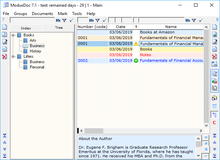
Giveaway of the day — ModusDoc 7.2.310
L'offre gratuite du jour pour ModusDoc 7.2.310 était valable le 28 juillet 2019!
Le catalogueur de données universel ModusDoc a été conçu pour cataloguer diverses données: documents, livres électroniques, livres audio, films, photos et autres fichiers, liens hypertexte, programmes, dossiers et notes dans une base de données afin de pouvoir y accéder rapidement et facilement.
Vous pouvez numériser un dossier ou un disque entier. ModusDoc crée des groupes d'arborescence en fonction de la structure des dossiers sur le disque et des enregistrements correspondants - des liens vers des fichiers.
Vous pouvez ajouter n'importe quel document à la base de données ModusDoc, y compris des livres électroniques, des livres audio, des films, des photos et autres fichiers, des raccourcis ou des dossiers, en les faisant simplement glisser avec la souris. Vous pouvez faire glisser des hyperliens, du texte sélectionné et des messages électroniques. Le catalogueur ModusDoc créera automatiquement les enregistrements correspondants (hyperliens ou notes). De plus, vous pouvez ajouter tous les objets situés dans un dossier en sélectionnant simplement le dossier dans la boîte de dialogue!
Les documents et autres fichiers peuvent être stockés directement dans la base de données ModusDoc ou la base de données peut stocker les liens hypertexte vers ces documents / fichiers.
Le catalogueur de données ModusDoc permet de créer un nombre illimité de bases de données. Chaque base de données peut avoir une configuration individuelle: avoir des colonnes cachées ou réarrangées, en ajouter de nouvelles de différents types (symbolique, textuel, numérique, logique, date, date et heure).
Chaque base de données ModusDoc comprend une table GROUPS et une table RECORDS. Les groupes sont présentés sur deux onglets, Index (structure linéaire) et Tree (structure hiérarchique); le programme génère l'arbre automatiquement!
Les outils de filtrage (sélection) situés immédiatement au-dessus des onglets de groupe et au-dessus de chaque champ de la table des enregistrements permettent de localiser rapidement et facilement les données requises.
Un groupe peut contenir des documents et autres fichiers (incorporés et liés, sous forme de liens hypertexte), des raccourcis vers les applications qui ont créé ces documents, des hyperliens vers des ressources Internet associées aux documents et programmes présentés dans le groupe, ainsi que des raccourcis de dossier et des notes.
Remarque: licence d'utilisation à vie pour 1 ordinateur.
Configuration minimale:
Windows 98/ XP/ Vista/ 7/ 8/ 10
Éditeur:
Valery KrasnovPage web:
http://www.modus58.net/modusdoc/index.htmlTaille du fichier:
4.8 MB
Prix:
$15.00
Titres en vedette
La version portable est installée sur un support amovible (clé USB) et peut être exécutée sur n’importe quel ordinateur fonctionnant sous Windows.
La version réseau est installée sur le serveur (ou le poste administrateur) et sur les postes de travail. Mot de passe administrateur - admin
La version en nuage est installée dans le nuage (magasin de données en nuage, tel que Dropbox) et peut être exécutée sur tout ordinateur doté de Windows.
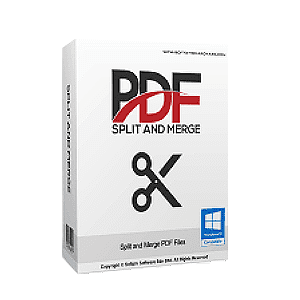
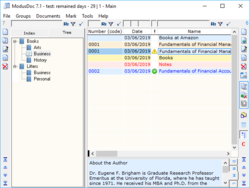

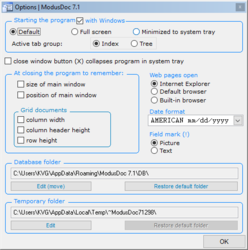
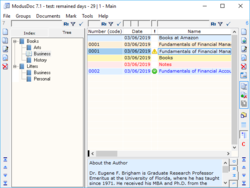

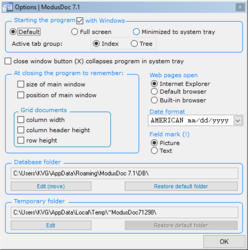
Commentaires sur ModusDoc 7.2.310
Please add a comment explaining the reason behind your vote.
I really have no clear idea what benefit this software package offers.
A video would be useful. As it is, I am far from convinced it is likely to be useful to me -- while it looks "complicated'. And frankly, I for one do not have time to sort out the workings of a programme that I might not ever need.
Sorry guys, but you've done little to convince the average joe just WHY we should need such a programme!
Save | Cancel
Tranmontane,
This is useful to users who manage larger file systems on their PCs. A relational database system is incredibly useful for those who have TB's of data and need a quick way to index and manage that data.
You start by scanning all the files on your PC, which will build a quick index of everything available. By adding different indexing values, you can start to build relationships. For example, I can add a value field of "Client" to all files in the index and then start updating files with the client the file is in relation to. Moving forward, I can quickly filter down to a specific client and see all files in the system in relation to them.
It takes time to set up a working process, but this software seems to be pretty straight forward for those who are trying to set something simple up in terms of database management on a local system.
However- I will say that the initial scan of a drive is pretty long. Not really a fault of the devs, but just something to keep in mind if you're trying to load in huge systems. My main drive took around ten mins.
Save | Cancel
It has a long way to go in the UX department. For example:
1. rollover bubble out (a user option (what? no user options) to turn on and off to expedite learning.
2. visual feedback while the DB is being created - (what is the program doing? as a % of whole or list of files)
3. Tutorials.
4. the ability to select index directories on multiple drives in one pass (Some docs are on C, some on the LAN-NAS, some are on removable devices)
5. index by subject, date and relationship (this invoice is associated with this PO, which is related to this check, which is related to this contract, which is related to this contractor. And the like.)
6. (not sure because it is still indexing.) but multiple flags and categories, for example this is for tax purposes, this is confidential this is privileged. but also flagged or labeled this was sent to lawyer w/date. Thus it describes how a file is used. In another example - an auto accident, there are many flags associations and people involved from the ins co to the lawyer so creating associations is a BIG deal, labels, colors etc can sort urgency.
Thanks for the test, it has some potential, but after 2 hours, it is still indexing so there is more once there is time to get into it.
Odd that this is V7.2
Save | Cancel
Looks as though it might be useful although there's obviously a bit of a learning curve to overcome.
Unfortunately, the program doesn't seem to recognise the FreeNAS drives I have shared to my Windows system (as drives X: and Y:). This is of course where all the files I might want to catalogue are stored. Ah, well...
I don't have a CD/DVD drive attached to this PC but I mounted a disc image and incorporated that into a quickly set up database. I can envisage this being useful for optical disc cataloguing purposes but the main benefit would seem to be creating e.g. a database of Comedy and then being able to incorporate all desktop, optical disc, NAS(!!) and online files, sources for Lenny Bruce under this.
I'd certainly be happy to give it a whirl once the NAS issue is sorted.
The obvious suggestion for improvement would be to address this
Save | Cancel
An undo last operation button would be helpful
Scanning the contents even of an SSD partition of moderate size seems to take quite a long while
The program doesn't recognise items that it has already scanned in. Tackling this and being otherwise able to identify and remove duplicates would be useful.
I'd like to see more in the way of a button bar for operations and the potential to combine these as macros. There are buttons for various operations but these are scattered about the program window rather than being gathered together. Being able to place buttons to choice would be welcome
There is an array of filters but their use is not immediately apparent. Hopefully reference to the help file will clarify their purpose. Being able to save sets of filters for re-use would be welcome.
I crashed the program with an apparent operand error and then gave up.
Being able to watch key folders or to run regular or start-up updates would also be helpful.
Save | Cancel
Oh yes add a pause button! Let folks pause or stop and save location. I need to reboot and have no idea how long this indexing will take.
It needs a UX designer badly.
Save | Cancel